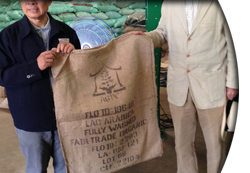ON THE GROUND
Fair trade doesn't just mean guaranteeing a purchase price to small producers; it also involves a direct commitment to these producers in order to help them improve their growing of coffee. This means travelling to the sites on a regular basis, being attentive to producers' requests and also to the political and economic context in which they live.
Fair Trade means helping producers acquire the infrastructure that will allow them to survive, along with their families in plantation areas.
UCIRI: A 15-YEAR PARTNERSHIP
This community, located in the Chiapas Mountains in Mexico, brings together 2,500 small growers and 55 different Indian communities. The arabica plantations are at an altitude of 2,500 meters and the coffee is grown according to organic standards. The income generated by Fair Trade has allowed the creation of two bus routes, a health clinic, a bank and an organic agriculture school. It has also allowed the community to invest in economic diversification projects to prevent rural flight.
LAST VISIT: VENEZUELA
In December we went to Venezuela to visit three cooperatives and study the quality of the various coffees, right where they grow. This visit focused on Biscucuy, Guarico, la Quebrada Azul and Asopotroy.
We were able to taste high-quality coffees and we saw the changes that Fair Trade has made in Quebrada Azul, such as the implementation of an administrative body and improved infrastructure.

TOGETHER WITH MALONGO:
HAITI: ENTREPRENEURIAL SOLIDARITY
For several years now, Haiti has suffered from a catastrophic economic and political situation. This country, considered by the United Nations to be one of the least developed in the world, has been severely depleted by these conditions. And yet, Haiti could produce extremely high-quality coffee and could become an important producer nation.
 My Cart
My Cart 






